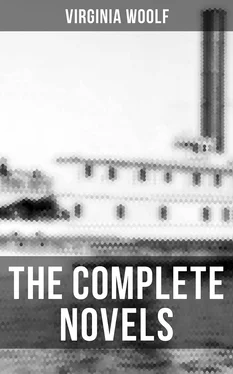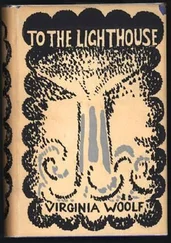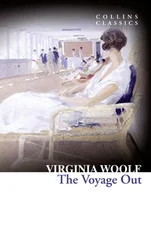“And the ordinary woman?”
“No, I don’t like the ordinary woman either—”
Ah, dear me, I’ve no doubt that’s very true, very true.” Mrs. Cosham sighed. “Swift would have agreed with you, anyhow—” She looked at him, and thought that there were signs of distinct power in his brow. He would do well, she thought, to devote himself to satire.
“Charles Lavington, you remember, was a solicitor,” Mrs. Milvain interposed, rather resenting the waste of time involved in talking about fictitious people when you might be talking about real people. “But you wouldn’t remember him, Katharine.”
“Mr. Lavington? Oh, yes, I do,” said Katharine, waking from other thoughts with her little start. “The summer we had a house near Tenby. I remember the field and the pond with the tadpoles, and making haystacks with Mr. Lavington.”
“She is right. There was a pond with tadpoles,” Mrs. Cosham corroborated. “Millais made studies of it for ‘Ophelia.’ Some say that is the best picture he ever painted—”
“And I remember the dog chained up in the yard, and the dead snakes hanging in the toolhouse.”
“It was at Tenby that you were chased by the bull,” Mrs. Milvain continued. “But that you couldn’t remember, though it’s true you were a wonderful child. Such eyes she had, Mr. Denham! I used to say to her father, ‘She’s watching us, and summing us all up in her little mind.’ And they had a nurse in those days,” she went on, telling her story with charming solemnity to Ralph, “who was a good woman, but engaged to a sailor. When she ought to have been attending to the baby, her eyes were on the sea. And Mrs. Hilbery allowed this girl—Susan her name was—to have him to stay in the village. They abused her goodness, I’m sorry to say, and while they walked in the lanes, they stood the perambulator alone in a field where there was a bull. The animal became enraged by the red blanket in the perambulator, and Heaven knows what might have happened if a gentleman had not been walking by in the nick of time, and rescued Katharine in his arms!”
“I think the bull was only a cow, Aunt Celia,” said Katharine.
“My darling, it was a great red Devonshire bull, and not long after it gored a man to death and had to be destroyed. And your mother forgave Susan—a thing I could never have done.”
“Maggie’s sympathies were entirely with Susan and the sailor, I am sure,” said Mrs. Cosham, rather tartly. “My sister-in-law,” she continued, “has laid her burdens upon Providence at every crisis in her life, and Providence, I must confess, has responded nobly, so far—”
“Yes,” said Katharine, with a laugh, for she liked the rashness which irritated the rest of the family. “My mother’s bulls always turn into cows at the critical moment.”
“Well,” said Mrs. Milvain, “I’m glad you have some one to protect you from bulls now.”
“I can’t imagine William protecting any one from bulls,” said Katharine.
It happened that Mrs. Cosham had once more produced her pocket volume of Shakespeare, and was consulting Ralph upon an obscure passage in “Measure for Measure.” He did not at once seize the meaning of what Katharine and her aunt were saying; William, he supposed, referred to some small cousin, for he now saw Katharine as a child in a pinafore; but, nevertheless, he was so much distracted that his eye could hardly follow the words on the paper. A moment later he heard them speak distinctly of an engagement ring.
“I like rubies,” he heard Katharine say.
“To be imprison’d in the viewless winds,
And blown with restless violence round about
The pendant world….”
Mrs. Cosham intoned; at the same instant “Rodney” fitted itself to “William” in Ralph’s mind. He felt convinced that Katharine was engaged to Rodney. His first sensation was one of violent rage with her for having deceived him throughout the visit, fed him with pleasant old wives’ tales, let him see her as a child playing in a meadow, shared her youth with him, while all the time she was a stranger entirely, and engaged to marry Rodney.
But was it possible? Surely it was not possible. For in his eyes she was still a child. He paused so long over the book that Mrs. Cosham had time to look over his shoulder and ask her niece:
“And have you settled upon a house yet, Katharine?”
This convinced him of the truth of the monstrous idea. He looked up at once and said:
“Yes, it’s a difficult passage.”
His voice had changed so much, he spoke with such curtness and even with such contempt, that Mrs. Cosham looked at him fairly puzzled. Happily she belonged to a generation which expected uncouthness in its men, and she merely felt convinced that this Mr. Denham was very, very clever. She took back her Shakespeare, as Denham seemed to have no more to say, and secreted it once more about her person with the infinitely pathetic resignation of the old.
“Katharine’s engaged to William Rodney,” she said, by way of filling in the pause; “a very old friend of ours. He has a wonderful knowledge of literature, too—wonderful.” She nodded her head rather vaguely. “You should meet each other.”
Denham’s one wish was to leave the house as soon as he could; but the elderly ladies had risen, and were proposing to visit Mrs. Hilbery in her bedroom, so that any move on his part was impossible. At the same time, he wished to say something, but he knew not what, to Katharine alone. She took her aunts upstairs, and returned, coming towards him once more with an air of innocence and friendliness that amazed him.
“My father will be back,” she said. “Won’t you sit down?” and she laughed, as if now they might share a perfectly friendly laugh at the tea-party.
But Ralph made no attempt to seat himself.
“I must congratulate you,” he said. “It was news to me.” He saw her face change, but only to become graver than before.
“My engagement?” she asked. “Yes, I am going to marry William Rodney.”
Ralph remained standing with his hand on the back of a chair in absolute silence. Abysses seemed to plunge into darkness between them. He looked at her, but her face showed that she was not thinking of him. No regret or consciousness of wrong disturbed her.
“Well, I must go,” he said at length.
She seemed about to say something, then changed her mind and said merely:
“You will come again, I hope. We always seem”—she hesitated—“to be interrupted.”
He bowed and left the room.
Ralph strode with extreme swiftness along the Embankment. Every muscle was taut and braced as if to resist some sudden attack from outside. For the moment it seemed as if the attack were about to be directed against his body, and his brain thus was on the alert, but without understanding. Finding himself, after a few minutes, no longer under observation, and no attack delivered, he slackened his pace, the pain spread all through him, took possession of every governing seat, and met with scarcely any resistance from powers exhausted by their first effort at defence. He took his way languidly along the river embankment, away from home rather than towards it. The world had him at its mercy. He made no pattern out of the sights he saw. He felt himself now, as he had often fancied other people, adrift on the stream, and far removed from control of it, a man with no grasp upon circumstances any longer. Old battered men loafing at the doors of public-houses now seemed to be his fellows, and he felt, as he supposed them to feel, a mingling of envy and hatred towards those who passed quickly and certainly to a goal of their own. They, too, saw things very thin and shadowy, and were wafted about by the lightest breath of wind. For the substantial world, with its prospect of avenues leading on and on to the invisible distance, had slipped from him, since Katharine was engaged. Now all his life was visible, and the straight, meager path had its ending soon enough. Katharine was engaged, and she had deceived him, too. He felt for corners of his being untouched by his disaster; but there was no limit to the flood of damage; not one of his possessions was safe now. Katharine had deceived him; she had mixed herself with every thought of his, and reft of her they seemed false thoughts which he would blush to think again. His life seemed immeasurably impoverished.
Читать дальше












